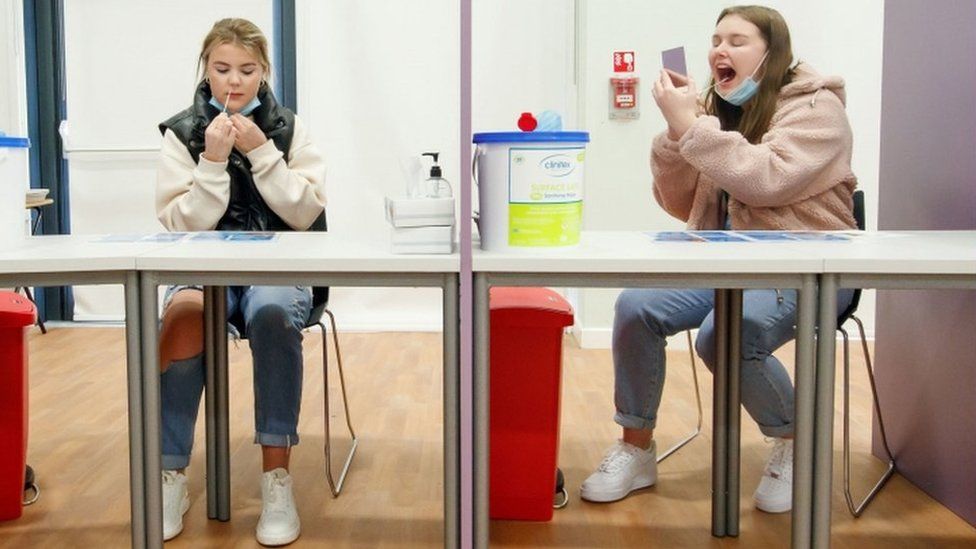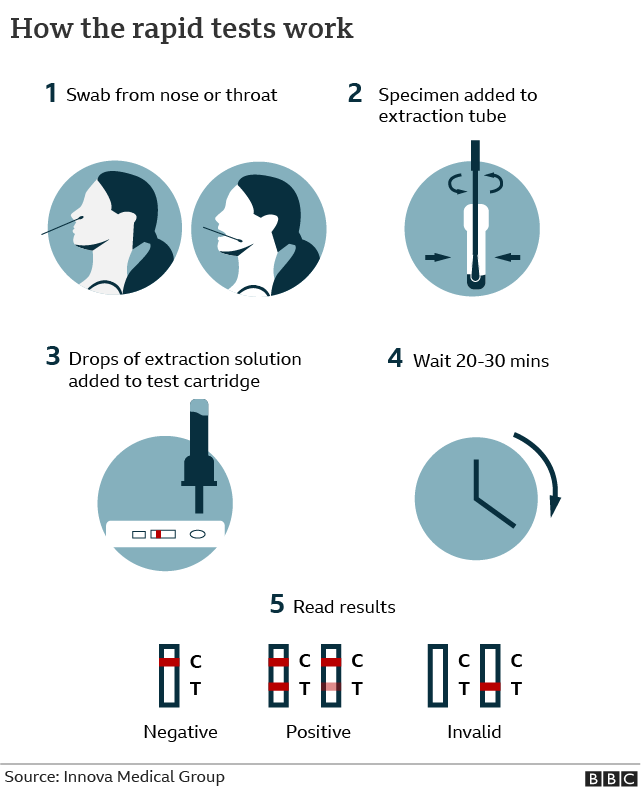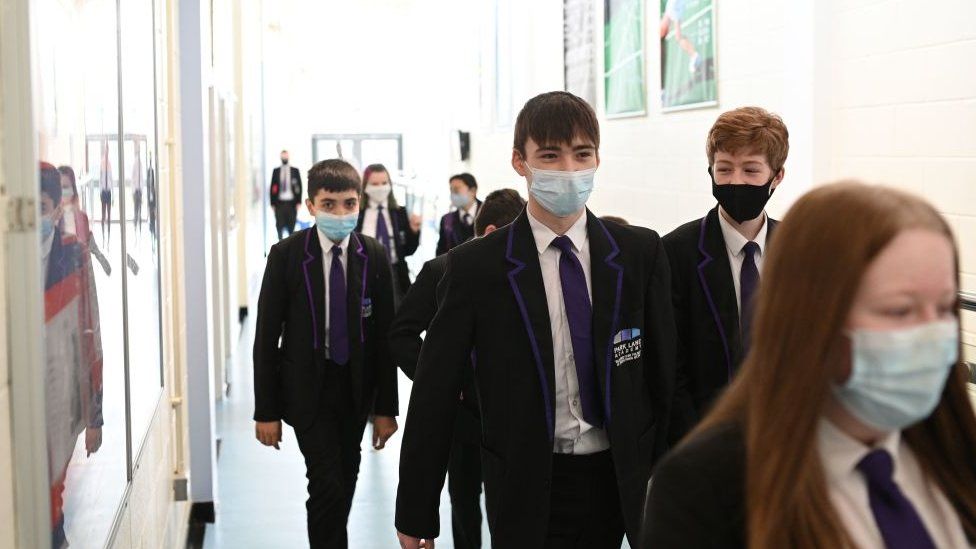Longer school days and shorter holidays are among the measures the government is considering to help pupils in England catch up on lost learning, the education secretary has said.
Gavin Williamson told the BBC ministers were looking at "how the school year runs" after the disruption of Covid.
He also told Sky News a five-term year and changes to summer holidays were under consideration.
Schools in England are reopening to all pupils on Monday.
It marks the first step of the "road map" out of the national lockdown, which has been in place since the beginning of January and has seen most children learning from home since before Christmas.
Asked by the BBC's Andrew Marr whether the government was going to extend the school day, Mr Williamson said: "I think we should be evidence-based and we're looking at that, we're looking at how the school year runs."
Mr Williamson also told Sky News' Sophy Ridge that ministers were considering "a whole range of proposals".
The education secretary was asked whether schools would remain open if the R number rose above one, which means the number of cases is continuing to increase.
"We are very much factoring in as part of the road map that actually schools will be staying open," Mr Williamson told the BBC.
"That is why we are taking a cautious approach because we intend for it to be an irreversible approach and that schools will continue to remain open."
He also gave a guarantee that schools would return after the Easter holidays.

Dr Susan Hopkins, deputy director of Public Health England, said she did not think the reopening of schools should be paused if the R number rose above one.
With three weeks before the Easter holiday, she told the BBC there would be time to look at the data "very carefully".
She said the relationship between the number of cases and the number of deaths and hospitalisations would also change in the next phase of the pandemic because of the impact of vaccinations.
"Then we will be able to accept some cases in the community without needing further restrictions," she added.
Dr Hopkins said measures such as the testing of pupils to find asymptomatic cases would also help to keep R "at the lowest level possible".
Attendance at school will be mandatory for all pupils when they reopen in England - meaning they should not miss lessons without a valid reason.
However, pupils who are shielding have been asked to remain at home for a bit longer.


It is well-established that children are at incredibly low risk from the virus, while research by the Office for National Statistics has shown that teachers are at no higher risk of infection than other working-age people.
But what role schools will play in the wider spread of the virus remains more open for debate. Children, after all, come home and mix with their families.
Government advisers say schools have not been a key driver of infections so far. This much can be seen from the impact of the second national lockdown in England in November when infection levels fell despite schools being open.
But this was before the new UK variant became dominant. Modelling has suggested reopening schools now could be enough to drive the R number above one, which would lead to a growing epidemic.
Ministers have already indicated this matters less than it used to because the vaccination programme has begun to break the link between infection rates and serious illness and death - the R number is not one of their tests for slowing the pace of lifting lockdown. Only such high infection rates that risk a surge in hospitalisations that threatens the NHS is seen as a problem.

Secondary schools have been told that year groups can return on different days over the first week to allow for Covid testing.
Secondary pupils will be tested three times in the first two weeks of school and will then be given two tests each week to use at home.
These will be lateral flow tests, which involve taking a swab of the nose and throat and give a result within 30 minutes.
All primary and secondary school staff are also being offered twice-weekly rapid tests, and parents and carers can also get a twice-weekly test.
However, concerns have been raised that false positive results could mean pupils and their families being forced to self-isolate unnecessarily.
Tests done at home require a confirmatory PCR test - which are more accurate - but Dr Hopkins said those taken at school would not because they are done in a "specialised environment and individuals are trained to deliver it".
She added that evidence from lateral flow tests taken over the last eight weeks in real-life scenarios suggested the false positive rate was "extremely low" - less than one in 1,000.


Meanwhile, the National Education Union (NEU) has warned that secondary schools have struggled to get parental consent for testing of pupils, and said there needed to be a bigger ministerial push to encourage take-up.
Mr Williamson said the rollout of testing in schools over the last few weeks suggested they had the "highest take-up of any employment setting around the country".
The NEU has called for a phased return to schools in England - similar to the process in Scotland and Wales, where whole year groups are returning separated by several weeks.
The union also accused the government of failing to put adequate safety measures in place ahead of schools reopening.
Labour's shadow health secretary Jonathan Ashworth said schools should reopen but safety measures including adequate ventilation should have been put in place.
He added that it was also "disappointing" that teachers had not been prioritised for the coronavirus vaccine

- LOCKDOWN RULES: What are they and when will they end?
- SYMPTOMS: What are they and how to guard against them?
- LOOK-UP TOOL: How many cases in your area?

As well as undergoing testing, secondary school and college students are also being asked to wear face coverings in classrooms, where social distancing cannot be maintained, with the measure to be reviewed at Easter.
But this is not mandatory, and in primary schools pupils are not being required to wear face coverings when they return to face-to-face lessons. Nor will they be tested.
Mr Williamson said he hoped mask-wearing would be a "temporary measure".
Meanwhile, a survey has shown that the majority of parents in England will be happy to send their children back to school.
But two-thirds are concerned about the amount of learning lost, with some parents worried their child will never catch up.
The Department for Education has announced a £700m package to help pupils catch up on lost learning, including tutoring and summer schools.
There are different rules on schools across England, Scotland, Wales and Northern Ireland, as the UK's devolved nations have the power to set their own coronavirus restrictions.
The youngest pupils have already returned to school in Scotland and Wales, while some primary school pupils in Northern Ireland also return to school on Monday.

- THAT PETER CROUCH PODCAST: Crouchy and the boys discuss a footballer’s entourage...
- MONEY MOVES WITH TONI TONE: Author and financial content creator Bola Sol joins Toni to talk about how to embrace change and find opportunities

https://news.google.com/__i/rss/rd/articles/CBMiJmh0dHBzOi8vd3d3LmJiYy5jby51ay9uZXdzL3VrLTU2MzExNzIz0gEqaHR0cHM6Ly93d3cuYmJjLmNvLnVrL25ld3MvYW1wL3VrLTU2MzExNzIz?oc=5
2021-03-07 11:56:42Z
52781421935200




